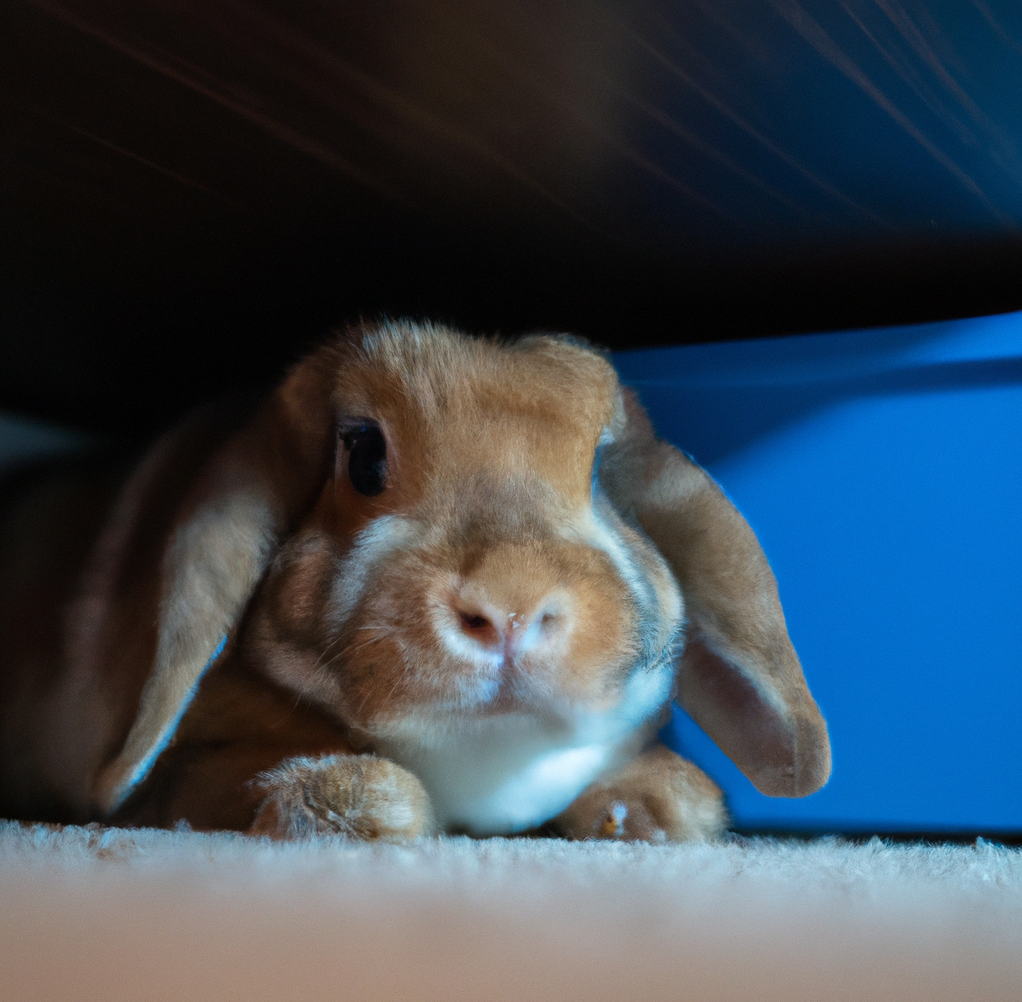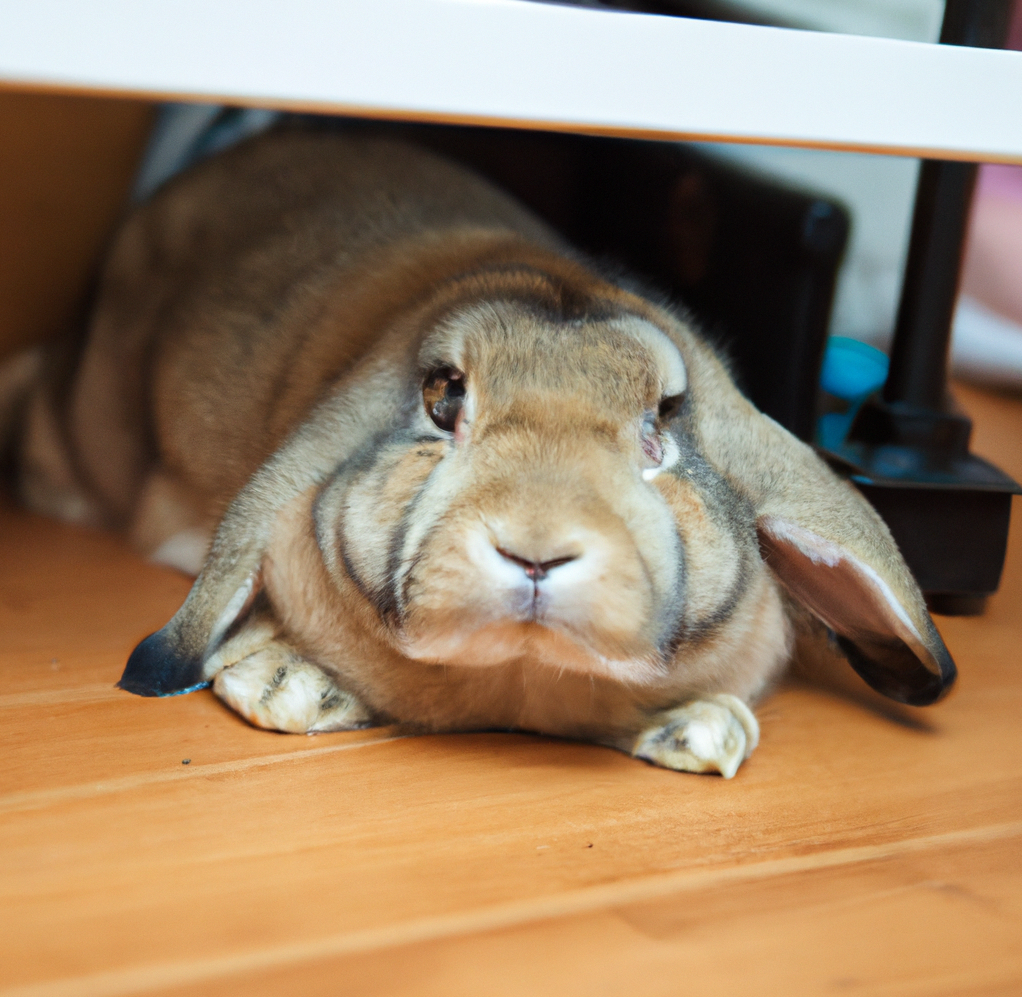Rabbits are social and intelligent animals with complex emotions. Stress can manifest in rabbits in a variety of ways, from biting and aggression to changes in behavior and appetite. Fortunately, there are several ways to help a stressed rabbit calm down and feel happy and secure. This guide will provide tips and advice on how to identify the signs of stress in rabbits and how to help them relax.
How to Identify Signs of Stress in Rabbits
Rabbits are social animals that can become easily stressed by changes in their environment. Signs of stress in rabbits can range from subtle to overt, and it is important to know how to identify these signs in order to keep your rabbit healthy and happy.
Subtle signs of stress in rabbits can include changes in behavior, such as reduced physical activity, lack of interest in food, and grooming. They may also become more skittish, withdrawn, or aggressive. If your rabbit is displaying any of these behaviors, it is important to pay attention and look for other signs of stress.
Physical signs of stress in rabbits can include excessive shedding, hair loss, and changes in appetite. They may also develop diarrhea or lose their appetite completely. These are all signs of stress and should be addressed.
Finally, changes in your rabbit’s environment can indicate stress. If your rabbit is in a new home or has been moved to a new cage, it may take some time for them to adjust and become comfortable. If your rabbit is displaying signs of stress, take some time to monitor their behavior and make any necessary changes to their environment to make them more comfortable.
It is important to be aware of the signs of stress in rabbits and to take action to reduce their stress levels. By recognizing the signs of stress and making any necessary changes, you can help your rabbit stay healthy and happy.
Tips for Reducing Stress in Rabbits
1. Provide a Safe Environment: Ensure that your rabbit has a safe and secure place to live, and give them plenty of space to move around. Keep their living area away from loud noises and other sources of stress.
2. Keep a Routine: Rabbits are creatures of habit and they thrive on routine. Feed them at the same times each day, and provide plenty of playtime and interaction.
3. Provide Enrichment: Provide your rabbit with plenty of enrichment activities like tunnels and boxes to explore, chew toys to play with, and hideouts to provide them with a sense of security.
4. Give Them Attention: Spend time with your rabbit each day. Bonding with your rabbit will help to reduce stress and keep them feeling content.
5. Monitor Their Health: Monitor your rabbit’s health and take them to the vet if you notice any changes in their behavior or physical health.
6. Provide Proper Nutrition: Provide your rabbit with a balanced and nutritious diet. Feed them fresh hay, vegetables, and high-quality pellets.
7. Avoid Over-Handling: Too much handling can be stressful for rabbits, so try to limit the amount of time you spend picking them up and petting them.
8. Respect Their Space: Respect your rabbit’s need for personal space. Don’t force them to interact if they are not feeling comfortable.
9. Create a Quiet Space: Create a quiet and comfortable place for your rabbit to retreat to when they are feeling overwhelmed.
10. Provide Companionship: Consider getting a friend for your rabbit, as having a companion can help to reduce stress.
Ways to Create a Calming Environment for Your Rabbit

1. Provide a Secure Space: Rabbits tend to feel safest when they have a secure space to retreat to. A secure space can be a cozy corner, a cardboard box, or even a tunnel. This space should be free from loud noises, other animals, and anything that may stress them out.
2. Provide Plenty of Toys: Toys can help keep your rabbit entertained and stimulated. The toys should be chewable and safe for them to play with. Toys that are specifically designed for rabbits can help give them something to focus on instead of being bored or anxious.
3. Make Sure the Cage is a Comfortable Size: Providing a comfortable cage size for your rabbit is important for creating a calming environment. A cage that is too small will leave your rabbit feeling anxious and stressed out. Make sure the cage is large enough to fit your rabbit comfortably and still have enough room for them to move around.
4. Provide Plenty of Bedding: Soft, comfortable bedding is important for rabbits. Make sure there is enough bedding in their cage or enclosure so they can burrow and nest. This will give them a sense of security and comfort and help them feel calm.
5. Play Calming Music: Music can be a great way to help create a calming environment for your rabbit. Look for calming and soothing music specifically designed for rabbits. This type of music can help reduce stress and anxiety and help your rabbit relax and feel safe.
6. Spend Time With Your Rabbit: Spending time with your rabbit is one of the most important things you can do to create a calming environment. Make sure to spend time with them every day, petting them and talking to them. This will help them bond with you and create a safe, secure environment.
The Benefits of Bonding with Your Rabbit
Bonding with your rabbit is an essential part of their overall wellbeing and can have significant benefits for their mental and physical health. With the right care and attention, rabbits can make great companions and can be a source of joy to both their owners and other people. Here are some of the benefits of bonding with your rabbit.
Firstly, bonding with your rabbit can help to create trust between the two of you. Rabbits are naturally shy and timid creatures, but with enough patience and kindness, they can learn to trust their owners and be comfortable in their presence. This will help to create a safe and secure environment for your rabbit and make it easier for them to interact with you.
Bonding with your rabbit can also help to reduce their stress levels. Rabbits are prone to stress and can become easily overwhelmed by loud noises and unfamiliar environments. Spending time with your rabbit and playing with them regularly can help to reduce their stress and keep them relaxed.
Bonding with your rabbit can also improve their physical health. Regular exercise is important for rabbits and can help to keep them active and healthy. Exercise can help to reduce the risk of obesity and other health problems associated with inactivity.
Bonding with your rabbit can also help to strengthen the bond between the two of you. Spending time together and playing with them can help to build a strong relationship and make your rabbit feel comfortable and secure.
Finally, bonding with your rabbit can help to improve their mental health. Rabbits are very intelligent creatures and can experience a range of emotions, including happiness and sadness. Spending time with your rabbit can help to make them feel secure and loved, which will help to boost their mental wellbeing.
Bonding with your rabbit is an important part of their overall wellbeing and can have significant benefits for their mental and physical health. With enough patience and kindness, rabbits can make great companions and can be a source of joy to both their owners and other people.
Tips for Handling a Stressed Rabbit

1. Provide a Quiet Environment: When a rabbit is stressed, they need a quiet and calm environment to help them relax. Ensure that the area is free from loud noises, sudden movements, and other potential stressors.
2. Offer Comfort Items: Comfort items, such as a soft blanket or toy, can help a stressed rabbit feel more secure. Providing these items can help them feel safer and more relaxed.
3. Provide Mental Stimulation: Stress can be caused by boredom or lack of mental stimulation. Providing activities, such as foraging for food or puzzle toys, can help a rabbit stay mentally stimulated and reduce stress levels.
4. Make Time for Bonding: Rabbits need regular bonding and socialization with their owners to feel secure and reduce stress. Make sure to spend time with your pet on a daily basis, and provide plenty of gentle petting and cuddles.
5. Avoid Punishment: Punishment can cause a rabbit to become more stressed and fearful. If needed, provide positive reinforcement to modify unwanted behaviors instead.
6. Monitor Health: Stress can cause health problems, so it’s important to keep an eye on your rabbit’s health and behavior. If you notice any changes, contact your veterinarian right away.
The Effects of Music on Relaxing Rabbits
Music is a form of art that can be used to elicit a variety of emotions. While it can be used for celebration, excitement, and other energizing purposes, it can also be used to relax and soothe. This article will discuss the effects of music on rabbits and how it can be used to help relax them.
Rabbits are small, social animals that are sensitive to their environment. They are easily startled, so it is important to create a quiet and calming atmosphere when caring for them. Music can be a helpful tool in creating this atmosphere, as it can help soothe and relax the rabbits.
When considering music for rabbits, it is important to choose music that is slow and calming. Music with a slower tempo and gentle tones can help the rabbits feel relaxed. Classical music is a great choice as it often contains soft and soothing melodies that can help reduce stress in rabbits. Music without lyrics is also recommended, as rabbits may be disturbed by the sound of human voices.
It is important to be mindful of the volume of the music. Rabbits have very sensitive ears and can be easily overwhelmed by loud music. Keeping the volume low and consistent helps the rabbits feel more relaxed.
In addition to helping relax the rabbits, music can also help them feel less anxious. Rabbits that are feeling anxious may be seen pacing or displaying other signs of discomfort. Soft and calming music can help reduce these signs of anxiety.
In conclusion, music can be a great tool for helping to relax and soothe rabbits. By choosing music that has a slow tempo and gentle tones, and keeping the volume low and consistent, rabbits can be provided with a peaceful and calming atmosphere.
Strategies for Reducing Anxiety in Rabbits
1. Provide a secure and comfortable living environment: Rabbits should be housed in a secure and spacious enclosure with plenty of places to hide. Introduce new items such as boxes, tubes, and tunnels to stimulate their environment and promote exploratory behavior.
2. Provide a safe space: Create a designated safe space for the rabbit to retreat to if they feel overwhelmed. This could be a small box or hut that the rabbit can enter and feel secure in.
3. Spend time with your rabbit: Bonding with your rabbit is essential for reducing anxiety. Spend time interacting with them, either by petting, grooming, or simply talking.
4. Offer playtime: Provide your rabbit with plenty of playtime with toys, such as balls or chew toys. This can help to reduce stress and provide mental stimulation.
5. Make changes gradually: If you have to make changes to the rabbit’s environment, do so gradually. This will give the rabbit time to adjust to the change and reduce the risk of stress or anxiety.
6. Provide enrichment: Enrichment activities such as foraging for food or treats, or digging for hidden items can help to reduce anxiety by providing mental stimulation.
7. Provide a calm environment: Minimize loud noises and sudden movements that could cause stress. You should also avoid using harsh tones or body language when interacting with the rabbit.
8. Seek professional help: If you have tried all of the above strategies and your rabbit is still exhibiting signs of anxiety, it is best to seek professional advice from an animal behaviorist.
Conclusion
In conclusion, calming a stressed rabbit can be a difficult task but with the right knowledge, patience and understanding it can be done. By providing the rabbit with a safe and comfortable environment, providing hiding places and plenty of distractions, and understanding the rabbit’s fear and anxiety, you can help the rabbit relax and feel safe. Remember to be patient and understanding and never try to force a rabbit when they are feeling stressed.

